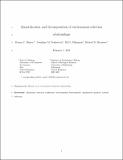Quantification and decomposition of environment-selection relationships
Abstract
In nature, selection varies across time in most environments, but we lack an understanding of how specific ecological changes drive this variation. Ecological factors can alter phenotypic selection coefficients through changes in trait distributions or individual mean fitness even when the trait-absolute fitness relationship remains constant. We apply and extend a regression-based approach in a population of Soay sheep (Ovis aries) and suggest unbiased metrics of environment-selection relationships that can be compared across studies. We then introduce a novel method which constructs an environmentally-structured fitness function. This allows calculation of full (as in existing approaches) and partial (acting separately through the absolute fitness function slope, mean fitness, and phenotype distribution) sensitivities of selection to an ecological variable. Both approaches show positive overall effects of density on viability selection of lamb mass. However, the second approach demonstrates that this relationship is primarily driven by effects of density on mean fitness, rather than on the trait-fitness relationship slope. If such mechanisms of environmental dependence of selection are common this could have important implications regarding the frequency of fluctuating selection, and how previous selection inferences relate to longer-term evolutionary dynamics.
Citation
Hunter , D C , Pemberton , J , Pilkington , J & Morrissey , M B 2018 , ' Quantification and decomposition of environment-selection relationships ' , Evolution , vol. 72 , no. 4 , pp. 851-866 . https://doi.org/10.1111/evo.13461
Publication
Evolution
Status
Peer reviewed
ISSN
1558-5646Type
Journal article
Description
The long term project on St Kilda has been largely funded by the UK Natural Environment Research Council. M. B. Morrissey is supported by a University Research Fellowship from the Royal Society (London). D. C. Hunter is funded by a PhD Scholarship from the University of St Andrews.Collections
Items in the St Andrews Research Repository are protected by copyright, with all rights reserved, unless otherwise indicated.

